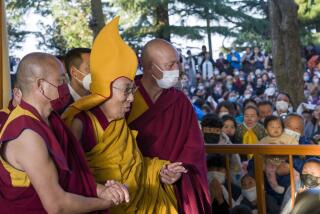Supporters Vow More Help for Tibet
- Share via
WASHINGTON — American supporters of Tibet vowed Monday to maintain the pressure on China that they believe contributed to Chinese President Jiang Zemin’s stated willingness to open a dialogue with the Dalai Lama.
“The campaign will continue until His Holiness is entertaining visitors in the Potala Palace” in the Tibetan capital, said Mary Beth Markey, director of governmental relations for the privately funded International Campaign for Tibet in Washington.
Markey said a “confluence of forces”--from strong congressional support to the effect of a pro-Tibet rock concert--probably persuaded Jiang that the international political cost was too high for China to maintain its traditional hostility to Tibetan aspirations.
But she and other pro-Tibet activists also said that Jiang’s remarks, made at the end of a news conference Saturday with President Clinton, seemed to signal little more than a change in atmosphere. The substance of China’s demand that Tibet acknowledge it is part of China remained intact.
Still, Jiang is the first Chinese leader to talk publicly about Tibet in relatively neutral terms; in the past, the Chinese government has coupled statements about Tibet with personal attacks on the Dalai Lama, the exiled Tibetan spiritual leader, and on other Tibetan officials.
“What is progress is that this became a matter for the [Chinese] public to listen to,” Markey said. “There is a lot of misinformation about what is happening in Tibet. There has been vilification of the Dalai Lama over the years. In that regard, this is quite amazing.”
*
In Dharamsala, the Dalai Lama’s headquarters in northern India, the Tibetan government-in-exile cautiously welcomed Jiang’s overture. Spokesman T. C. Tethong said Tibetans “applaud President Jiang Zemin for publicly recognizing the fact that Tibet is an important issue needing a solution and for indicating his willingness to have an exchange of views and discussions on this.”
Jiang, in comments Saturday, said: “Actually, as long as the Dalai Lama can publicly make the statement and a commitment that Tibet is an inalienable part of China--and he must also recognize Taiwan as a province of China--then the door to dialogue and negotiation is open.”
In response, Tethong said, the Dalai Lama has already “stated very unequivocally that he is not seeking independence. We hope the Chinese leadership will recognize the sincerity of His Holiness’ gesture and take a reciprocal step.”
In Los Angeles, the Dalai Lama’s followers were skeptical that the Clinton-Jiang remarks on Tibet offered new hope. In calling for the Dalai Lama to recognize China’s sovereignty over Taiwan, they said, the Chinese leader did nothing more than add another condition for negotiations.
“They have not changed their rhetoric at all,” said Tseten Phanucharas, former president of the Los Angeles Friends of Tibet organization. Although Jiang refrained from personally attacking the Dalai Lama during the televised weekend session with Clinton, China’s religious affairs minister had publicly railed against the Tibetan leader and denounced his regime as a “dark age” theocracy in earlier remarks, she said.
To improve relations, she added, the Chinese should take such concrete steps as freeing thousands of political prisoners--more than one-third of whom are Tibetans, she said.
*
Chinese troops occupied Tibet in 1950. The Dalai Lama, the country’s religious leader, fled to India in 1959 after an unsuccessful uprising against Chinese authorities. China maintains that the Himalayan region has always been a part of China, while Tibet supporters claim it was once an independent nation. The United States regards Tibet as part of China but urges Beijing to end its repression there.
Under pressure from Congress, Clinton last year appointed an official envoy to the Tibetan government-in-exile, a step that previous administrations had refused to take. Gregory Craig, whose primary job is director of policy planning for the State Department, holds the envoy post.
Times staff writer Teresa Watanabe in Los Angeles contributed to this report.
More to Read
Sign up for Essential California
The most important California stories and recommendations in your inbox every morning.
You may occasionally receive promotional content from the Los Angeles Times.













